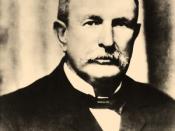Caterpillar's inception has its roots in entrepreneurship as the company started from an opportunity recognized by Caterpillar's founder, Benjamin Holt, after he saw the plight of California farmers who found wheels ineffective in preventing heavy equipment from sinking into soft muddy soil. Entrepreneurs perceive opportunities, act upon discovered opportunities, and believe that success is attainable (Shane and Venkatamaran, 2000; Stevenson and Gumpert, 1985). Holt was posthumously honored by the National Inventors Hall of Fame for his ingenuity and entrepreneurial spirit (Free Republic, 2006). Previous to Caterpillar, Holt founded the Holt Manufacturing Company. This successful venture later pioneered the use of the continuous track during World War I. The company then merged with competitor C.L. Best Tractor Co. in 1925, forming the Caterpillar Tractor Co. Both founders set the standard for innovation and quality that continues today.
Caterpillar was founded by two successful entrepreneurs within the entrepreneurial concept of opportunity recognition.
Considering these entrepreneurial attributes, it could be reasonably assumed that Caterpillar is an entrepreneurial company. Entrepreneurial activities can be analyzed at the individual level or firm level. However, the firm-level perspective of entrepreneurship is appropriate to capture the actual behaviors by the firm since entrepreneurial posture is significantly affected by multiple organizational system elements (Covin et al., 1991). In many situations, entrepreneurship is shown to be a firm-level phenomenon (Covin et al., 1991; Miller, 1983; Stevenson & Jarillo, 1986; Zahra, 1991, 1993). Entrepreneurial orientation is a business strategy companies invoke to assist in the pursuit of opportunities. "It represents a frame of mind and a perspective about entrepreneurship that is reflected in a firm's ongoing processes and corporate culture" (Dess and Lumpkin, 2005, p.147). "An entrepreneurial orientation may be viewed as a firm-level strategy-making process that firms use to enact their organizational purpose, sustain their vision, and create competitive...


